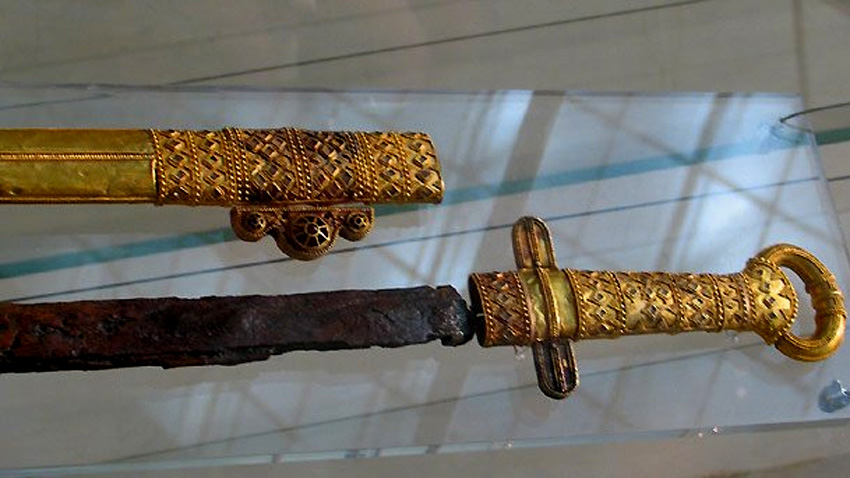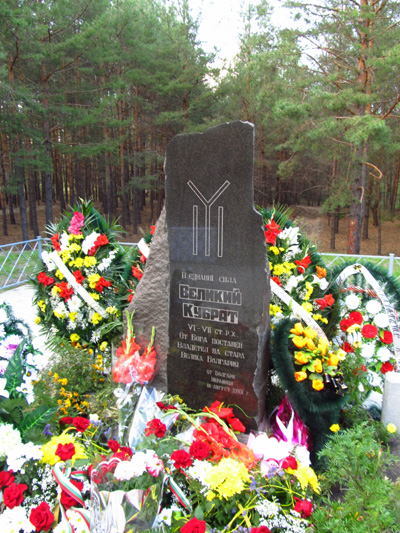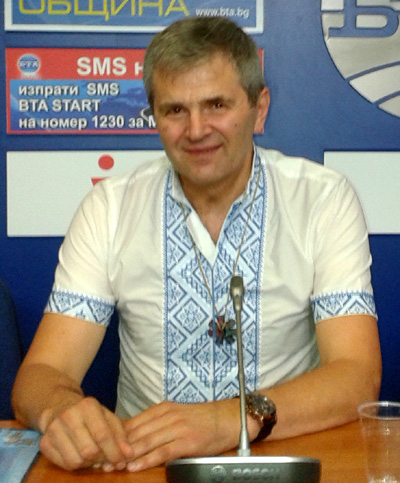We live almost 1,370 years after the death of Khan Kubrat – the person who established the Bulgarian statehood. Back in the 7th c. he unified the proto-Bulgarians in a military-tribal union, named Great Bulgaria. Its territory spread over the plains to the North of the Azov and Black Seas. There were lots of prairie empires in that region back then, but the Bulgarian one was the only survivor through the centuries – thanks to the statehood mastery of Khan Kubrat.
105 years ago fate gifted us with the discovering of that great ruler’s rich funeral. The spot had remained untouched for nearly 13 c. in the Ukrainian village of Mala Pereshchepina. In 1912 two kids came upon a treasure while playing along the river dunes. It turned out to be a big one and only the golden artifacts weighed over 20 kg., while the silver ones were measured to more than 50 kg. A few objects were displayed at the local Poltava Museum and perhaps yet in the early 20th c. most of the treasure was melted under Stalin’s orders, while the rescued objects were handed over to the State Hermitage Museum. Luckily, these turned out to be the major artifacts, proving that the grave belonged to the khan – the sceptre and sabre of Kubrat can be seen there, alongside other authority distinctions.

Hundreds of Bulgarians live in the Ukraine today, as the communities of the Tauri and Bessarabian are the largest ones. Their representatives participate in the region’s governing and are even elected Ukrainian MPs. MP Nikolay Gaber was the one to take up the initiative for the spotting and popularization of Khan Kubrat’s grave. At first a commemorative plate was placed there and in 2012 an all-Bulgarian congregation was held on the site with more than 3,500 participants from all over the world. A new large-scale event of that kind has being prepared for the fall of 2017. One of the goals of the initiative committee formed in Bulgaria and the Ukraine is the fundraising for the building of a new memorial complex, honouring the memory of Khan Kubrat and his successors. “I call this Ukrainian spot ‘the Bulgarian  Jerusalem’ as it is essential for the entire Bulgarian nation. May soon every one of us be able to visit the future complex, to touch the roots of our nation and statehood,” says Bulgarian MP Krassimir Bogdanov, chair of the organizational committee of the autumn congregation.
Jerusalem’ as it is essential for the entire Bulgarian nation. May soon every one of us be able to visit the future complex, to touch the roots of our nation and statehood,” says Bulgarian MP Krassimir Bogdanov, chair of the organizational committee of the autumn congregation.
He also expressed his content that most of his colleagues had supported the memorial initiative with their own money.
“The initiative committee also enjoys the full support of the Ukrainian and the Poltava Oblast authorities,” says Engineer Delyan Damyanovski, executive director of the National Association of Municipal Councils in Bulgaria. “We felt really proud when, upon entering the Mala Pereshchepina mayoralty, we saw the Bulgarian flag placed alongside the Ukrainian one. It can be seen at many spots there. We have the full support of the Ukrainian authorities for our congregation and also for the construction of the memorial complex.”
 “The place has been unanimously recognized as the grave of Khan Kubrat. Many Bulgarians are to visit the site in the future,” says President of the Khan Kubrat International Charity Fund Rumen Spasov, a resident of the Ukraine for the past 20 years. “We, citizens, are the ones in charge of changing the attitude towards this sacred place for Bulgaria, not the clerks. The initial all-Bulgarian gathering took place there 5 years ago. Now, 5 years later I thought it was my turn to organize the Bulgarians. It happened like that – I had to return to Bulgaria for a longer period of time and step-by-step I began to persuade people. The initiative united us quickly and now we count to more than 30 people, representatives of civic organizations with lots of members, actively working for the cause.”
“The place has been unanimously recognized as the grave of Khan Kubrat. Many Bulgarians are to visit the site in the future,” says President of the Khan Kubrat International Charity Fund Rumen Spasov, a resident of the Ukraine for the past 20 years. “We, citizens, are the ones in charge of changing the attitude towards this sacred place for Bulgaria, not the clerks. The initial all-Bulgarian gathering took place there 5 years ago. Now, 5 years later I thought it was my turn to organize the Bulgarians. It happened like that – I had to return to Bulgaria for a longer period of time and step-by-step I began to persuade people. The initiative united us quickly and now we count to more than 30 people, representatives of civic organizations with lots of members, actively working for the cause.”
English version: Zhivko Stanchev
The book "Icons from the National Church Historical and Archaeological Museum" - a huge work of over 500 pages, with more than 700 published photographs and accompanying scientific articles, was officially presented a few days ago. The unique..
A humble military chaplain made his first contact with Bulgaria in 1921, arriving with the mission of searching for Italian soldiers who had disappeared without a trace during World War I. However, he did not remain indifferent to the fate of this small..
Beloslav is a small town on one of the branches of Varna Lake. Yet it is here, in this quiet little town, that the only preserved Bulgarian submarine – Slava – is anchored . It was decommissioned a long time ago, and has now been turned in one of..

+359 2 9336 661
